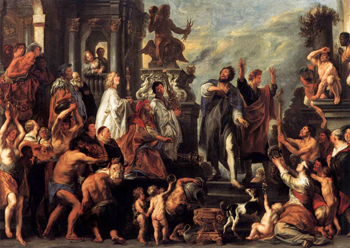By Mark Ellis —

In February, a polarizing and provocative Jewish conservative was due to speak at UC Berkeley, but a peaceful protest turned into a riot, with bricks, rocks, and fireworks thrown, fires set, stores looted, and police barricades used as battering rams to breach the venue where this man was about to speak.
Under police escort, this controversial speaker had to be evacuated from the scene for his own protection, or he might have been torn apart by the mob.
That description is not much different from what happened to another polarizing and provocative Jewish speaker, the Apostle Paul, who seemed to stir up riots in many of the places he spoke some two thousand years ago.
What could have been so controversial? Why were people so riled up?
Before Jesus ascended to heaven, he gave us a mission: to make disciples among every nation and people group throughout the world, to baptize them, and teach them to observe his commands.
He said that once we finished this great mission, taking the gospel to the whole world, then he would return to rule and reign over the earth.
Paul became one of the first and perhaps greatest missionaries to launch this worldwide movement. The most exciting thing is that the finish line is in sight to complete the mission.
In Acts 23, the Apostle Paul was at the end of his third mission trip, about 57 A.D. He came back to Jerusalem because he wanted to share the gospel with his brothers and sisters, the Jewish people, one more time during the feast of Pentecost. He had also collected money to help the struggling believers there.
 When Paul went to the Temple, some Jews from Ephesus recognized him, started yelling, raising a ruckus, and knocked him to the ground. Then they stirred up the crowd against him, alleging that Paul was against the Law of Moses and the Temple.
When Paul went to the Temple, some Jews from Ephesus recognized him, started yelling, raising a ruckus, and knocked him to the ground. Then they stirred up the crowd against him, alleging that Paul was against the Law of Moses and the Temple.
These Ephesian Jews were calling for Paul’s death, the crowd was whipped up, and Paul would have been killed if it wasn’t for a Roman garrison nearby that heard the uproar, raced to the scene, and rescued him.
Paul got permission from the Roman commander to speak to the crowd. He told about how he once persecuted the Christians, how the risen Jesus confronted him on the Damascus Road, and how his life was changed.
But when Paul told the crowd that he was given a mission to reach the Gentiles, this sparked another riot, and the Romans had to grab him once more to protect him from the mob. Because of extreme prejudice, the Jews considered the Gentiles to be unworthy of God’s favor.
After Paul revealed he was a Roman citizen, the commander took Paul to the Sanhedrin, their Supreme Court, and placed him before the High Priest, the Pharisees and Sadducees.
Paul generated another uproar when he told them, “I am on trial for speaking about our hope and the resurrection from the dead.” Once again, the Romans had to rescue Paul and take him back to their barracks.
In Acts 23:11, it says, “The following night the Lord stood near Paul and said, “Take courage! As you have testified about me in Jerusalem, so you must also testify in Rome.”
“The next morning some Jews formed a conspiracy and bound themselves with an oath not to eat or drink until they had killed Paul. More than forty men were involved in this plot. They went to the chief priests and the elders and said, “We have taken a solemn oath not to eat anything until we have killed Paul.”
A plot formed to kill Paul. What could ignite such hostility? Paul had been openly declaring that Jesus of Nazareth, who they rejected, had risen from the dead and was their promised Messiah.
Jesus warned about persecution
Jesus taught that his followers would face opposition. In Matthew 5, he said, “Blessed are you when men cast insults at you, and persecute you, and say all kinds of evil against you falsely, on account of Me. Rejoice, and be glad for your reward in heaven is great, for so they persecuted the prophets before you.”
In John 15 & 16, Jesus said, “If the world hates you, you know that it has hated Me before it hated you…If they persecuted Me, they will also persecute you.” He said, “They will make you outcasts from the synagogue, but an hour is coming for everyone who kills you to think that he is offering service to God.”
This is the predicament Paul found himself in, and many Christians around the world continue to find themselves in today. If you stand up boldly for the name of Jesus, you will face criticism, mocking, some rejection, you may lose friends. In some countries, you might lose your life.
Paul was not exempt from such opposition and we are not exempt. The amazing thing is

that the places where the persecution against the church is the strongest, in those places the church grows the fastest. Iran, right now, is one of the places in the world where the church (underground) is growing most rapidly.
You may face pressure within your own family to keep silent about Jesus. You may not be able to talk about him at work. I know a set of grandparents, that if they say anything about Jesus to their grandchildren, they will be cut off, not allowed to see their own grandchildren.
So here’s Paul, and he’s not just facing criticism, he’s facing 40 desperate men who hate the gospel of God more than anything. And they think they will do God a favor if they put Paul to death. They believed it was their religious duty to get rid of him.
Three things that helped Paul
How did Paul deal with such pressures? How can we cope when we face opposition because of our faith? There are three things that were vital for Paul to maintain his presence of mind and that should also be important for us.
First, Paul lived with a clear conscience. In Acts 23:1 Paul said, “I have fulfilled my duty to God in all good conscience to this day.” He had a good conscience, a clear conscience.
Your conscience is that inner voice God has placed within your heart that will either accuse you or excuse you for your thoughts and actions. The problem is that over time, it can become numbed or incapacitated by sin.
The Bible speaks of having a defiled conscience in Titus 1:15: “To the pure, all things are pure; but to those who are defiled and unbelieving, nothing is pure, but both their minds and their consciences are defiled.”
Scripture also speaks of having a seared conscience in 1 Tim. 4:2 – “In later times, some will fall away from the faith, paying attention to deceitful spirits and doctrines of demons…seared in their own conscience as with a branding iron.”
A branding iron sears the flesh so it becomes numb in the area it touches. For some, their conscience has become numb; things that used to make them blush no longer make them blush.
Some of our children – by the time they reach high school — have seen so much violence and dark, occult images, and sexual content in films and on the Internet, that their conscience no longer works the way God designed it to work.
Even worse than having a defiled conscience or a seared conscience, the Bible speaks of having an evil conscience. (Hebrews 10:22) People can become so distorted in their outlook, they call evil good and good evil. (Isa.5:20)
How do we find our way back to a clear conscience? The answer is to confess your sins to God and turn away from your sins.

The Scripture says, “If we confess our sins, he is faithful and just to forgive us our sins and to cleanse us from all unrighteousness.” (1 John 1:9)
That cleansing comes from the blood of Jesus, shed for you on the cross. Hebrews 10:22 says, “let us draw near with a true heart in full assurance of faith, with our hearts sprinkled clean from an evil conscience and our bodies washed with pure water. Let us hold fast the confession of our hope without wavering, for he who promised is faithful.
The second thing that helped Paul cope with opposition was that he stood on a firm foundation of truth. The central truth he stood on was the resurrection of Jesus Christ and Paul sought resurrection power to propel his ministry forward.
In Philippians 3, Paul said, “Oh that I may know Him, and the power of His resurrection, and the fellowship of His sufferings…that I may attain to the resurrection from the dead.” This is the hope of humanity, that death has lost its sting, and we will rise just as He rose.
When I was 29-years-old I read the book, Evidence that Demands a Verdict, by Josh McDowell. His chapter on the resurrection was the most important chapter to me in the book.
I knew that if Jesus really did rise from the dead, that set him apart from Buddha and Mohammad and every other religious leader. If He really did rise from the dead, that changed everything.
I was a rationalist, a Berkeley liberal, schooled in secularism, and I needed proof, solid proof. I didn’t want to take a blind leap of faith.
But as I examined the evidence, the arguments pro and con about what happened to the body of Jesus, I was convinced the resurrection of Jesus was a historical event.
When I recognized that truth I immediately dropped to my knees, confessed my sins, and prayed to receive Jesus as Savior and Lord, and my life changed from that day forward.
Because Paul stood on truth –the central truth of the resurrection – that helped him when he faced tremendous pressures that came against him. Pray as Paul did, to know His resurrection power. The power contained in that truth will help you take a stand for Jesus.
The third thing that helped Paul in his time of need resulted from his personal encounters with the risen Christ, which he carried with him as a promise. At the beginning of Acts 23, Paul was probably pretty discouraged, sitting in the barracks at night, perhaps feeling lonely and forsaken.
And we see Jesus come to him in verse 11 – in his time of need – saying, “Take courage! As you have testified about me in Jerusalem, so you must also testify in Rome.”
We don’t know if Jesus appeared personally or as a vision, but Jesus gave him a spiritual bear hug when he needed it most. It gave Paul comfort and reassurance that God was with him.
And it was a promise that Paul could take to the bank. No matter what plots or plans or evil schemes were directed against him, Jesus personally told Paul he would be witnessing for him in Rome.
And even if you have not had personal encounters with Jesus like this, the Bible is full of promises for you, promises you can take to the bank.
Promises of God
Let me mention just a couple promises contained in God’s Word:
Isaiah 40:29 says, “God gives strength to the weary and increases the power of the weak.
Isaiah 40:41 says, “Those who hope in the Lord will renew their strength. They will soar on wings like eagles; they will run and now grow weary, they will walk and not be faint.”
Isaiah 41:10 says, “Do not fear for I am with you; do not be dismayed for I am your God. I will strengthen you and help you; I will uphold you with my righteous right hand.”
What are you anxious about this morning? Don’t you know that God takes care of the birds of the air and the lilies of the field? How much more does he love you; how much more will He take care of you?
I only mentioned three promises, but there are hundreds of promises contained in the Bible. There is a website called 365promises.com that gives you a promise from God for every day of the year.
In the section of Scripture related to the plot to kill Paul, we don’t see God intervene directly, but we see his hand operating behind the scenes to make sure Paul is kept safe and makes it to Rome.
How does the plot to kill Paul get discovered? We find out Paul has a sister living in Jerusalem and her son, a young lad perhaps in his early teens, somehow overhears the men plotting.
We never knew Paul had a sister or a nephew or anything about his family, but by a gigantic coincidence this young man we’ll call Gabriel is at the right place at the right time to uncover this assassination plot, and he goes to warn Paul.
Once he hears about it, Paul sends young Gabriel to the commander who gets very alarmed and arranges for a small army of 470 men to escort Paul at night to Herod’s palace, where Paul will meet with the governor.
When God moves behind the scenes
When we see God moving behind the scenes to accomplish his purposes using the natural arrangement of people and circumstances, rather than outright miracles, we call this God’s providence. God’s providence allows him to use good men or evil men to accomplish his purposes.
Throughout the Bible, we see God’s providential care preserving his people from dangers and destruction. What some observers may refer to as luck or coincidence or fate is really the providence of God.
It has been said, “God’s ways are behind the scenes, but He moves all the scenes which He is behind. (John Nelson Darby) And he’s moving these scenes so that His plan is victorious.
When Columbus was sailing for America his original course would have taken him to Virginia. But he saw a flock of birds flying toward the southwest. And because they had been at sea so long and his men were grumbling and complaining and growing mutinous, he changed his course and ended up hitting the West Indies instead of Virginia.
That course correction caused by a flock of birds led to the early colonies being dominated by England instead of Spain. And history is filled with these seemingly random or unlikely circumstances that amount to huge shifts in world events.
With God’s hand moving behind the scenes, little hinges can swing big doors.
If we lived in a world of random chance, that would be a scary world to live in. You would never know what bad thing might happen to your loved ones. In a world of pure chance, all you can hope for is good luck.
But in all the things that may seem random and incomprehensible, God is working them out for his glory, for the return of Jesus, and for your good.
Now God’s providence doesn’t mean we can sit on the sidelines, be passive, and do nothing, watching life unfold.
When young Gabriel came to warn Paul, Paul didn’t say, “Don’t worry. God promised I will go to Rome, so we don’t need to do anything.” No, Paul sent him to the commander. And God had prepared the commander’s heart to be receptive and to respond with 470 soldiers.
When a farmer prays for a corn crop, God expects him to say amen with a plow. Whether you are praying for a new job or a spouse, you need to take some initiative in the process. Don’t sit at home waiting for heaven to open and that job or that person to knock on your front door.
You are the hands and feet of Jesus. You have a role to play in God’s mission, to be a light and witness to your family and friends. Your mission will probably begin at home or in your neighborhood. Be a missionary there, before you go to the nations.
How do you cope when you face criticism, rejection, mocking, or ridicule when you stand up for your faith?
- Make sure your conscience is clear, that you don’t have un-confessed sin in your life.
- Stand on the truth of God’s Word; when you run out of gas, let His resurrection power lift you up and renew your strength.
- Remember God’s promises – given to you, all through the pages of Scripture and remember how he has sustained you through tough times.
Even if God is behind the scenes in ways you don’t always recognize, He has given you a promise that can never be broken: “I will never leave you, nor forsake you.”



